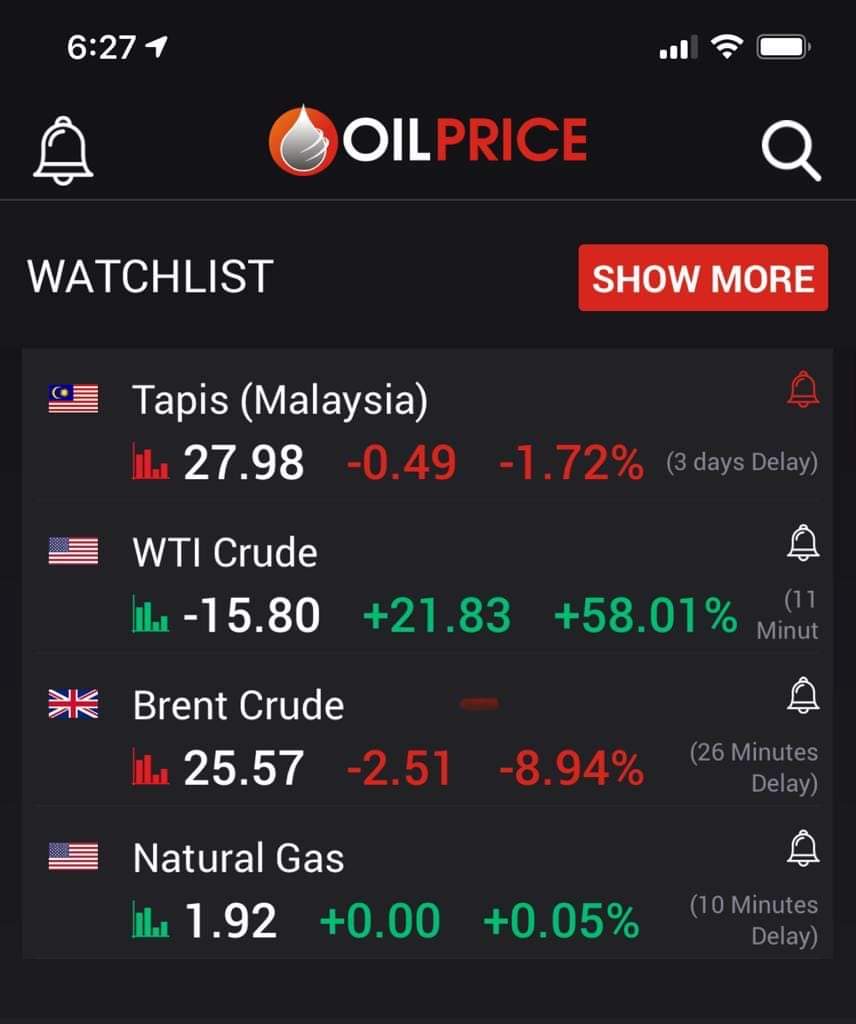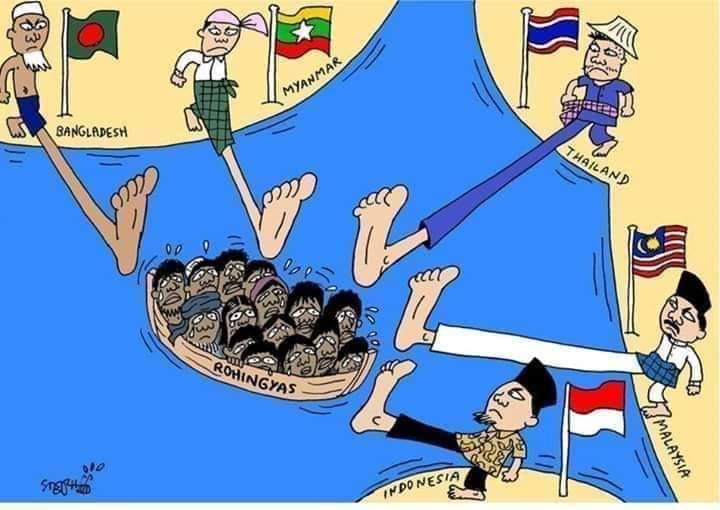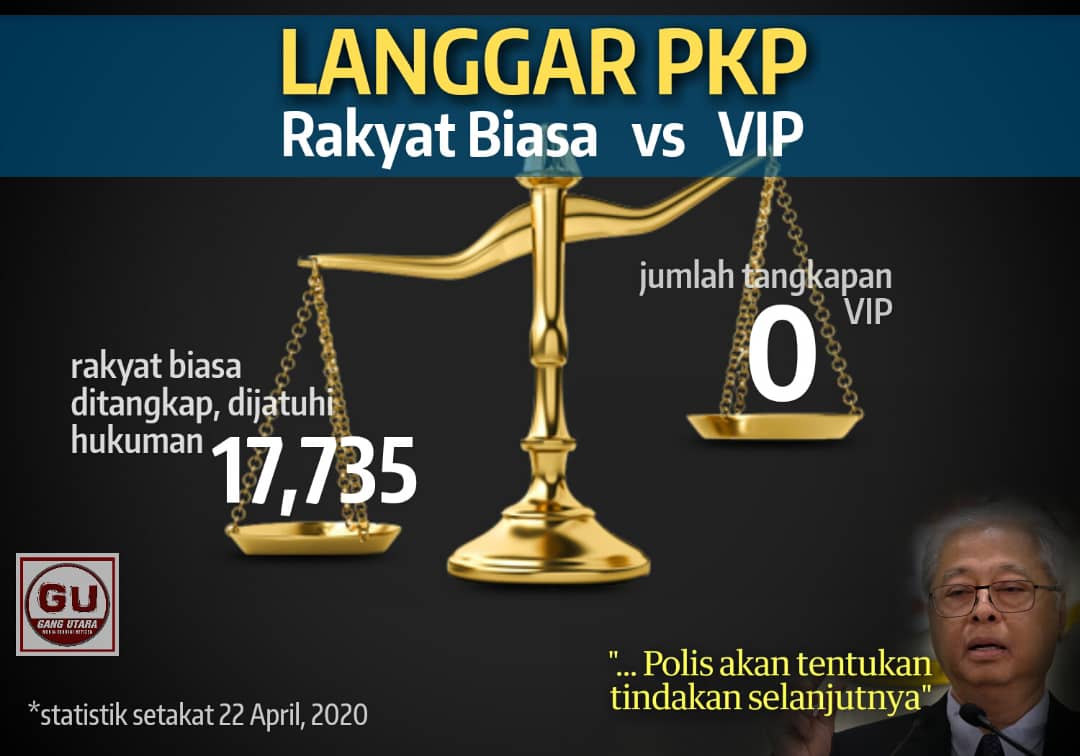Tulah Melayu tak habis2 dengan tamak dan irihati...f/bk

Harga minyak jatuh ke negatif!"
"Habis lah!"...
Rileks, harga minyak mentah sedunia memang jatuh teruk, tapi yang jatuh 306% jadi $-37.63 setong tu cuma harga bagi "West Texas Intermediate" (WTI) keluaran US.
Untuk minyak Brent (keluaran Shell UK), harga masih positif, dalam $25. Harga minyak "Tapis" keluaran Malaysia pun masih $28, jatuh 1.7% je.
Minyak mentah ni macam kurma juga. Lain tempat lain keluaran, walaupun semua dikenali sebagai kurma. Ajwa tu keluaran Madinah, Deglet Noor Algeria, Medjool dari Morocco. Kualiti pun lain-lain.
Minyak mentah pula, selain WTI dan Brent, ada juga ESPO (Rusia), Urals (Rusia), Maya (Mexico), Minas (Indonesia) dan macam-macam lagi. Keluaran Malaysia selain "Tapis" ada juga "Bintulu Condensate", "Miri" dan lain-lain. Kualiti berbeza-beza ikut kandungan sulfur ("sweet" atau "sour") dan graviti ("heavy" atau "light").
Minyak WTI ni "sweet" dan "light", ramai suka beli, sebab tu harganya dijadikan "benchmark" dan dilaporkan dalam berita setiap hari bersama-sama Brent. Tapi harga WTI tak mewakili semua minyak yang ada di pasaran.

Minyak mentah ni pembeli dia adalah syarikat-syarikat pemprosesan minyak. Diorang tak beli on the spot tapi beli in advance pakai "futures" supaya boleh manage risiko perubahan harga.
Yang jadi negatif ni adalah kontrak untuk penghantaran Mei. WTI ni bersifat "physical delivery", kau order untuk Mei, minyak tu secara fizikal sampai kat kau selaku pemegang kontrak Mei.
Gila apa, time-time ni siapa nak pakai minyak. Stok minyak masih berlambak sebab hampir satu dunia masih dalam lockdown. Kereta tak leh jalan, kapal terbang tak leh terbang, nak buat masak pun tak boleh walaupun "sweet" konon.
Jadi, disebabkan kontrak untuk Mei 2020 akan expire pada esok waktu tempatan US (21 April 2020), orang just lepaskan kontrak tu tak kisah apa harga. Better rugi duit kontrak dari minyak tu hantar kat kilang kau. Sebab tu harga jatuh ke negatif.
Kalau Brent tak jadi macam tu sebab dia boleh "roll over", tak nak kontrak Mei boleh jual ganti dengan kontrak Jun. Sebab tu tak ada masalah yang sama.

Tapi harga kontrak WTI untuk Jun sebenarnya masih OK, masih di paras $20, dan akan naik selepas itu sebab minggu lepas negara OPEC (yang diketuai Saudi) dan bukan OPEC (seperti Rusia dan US) dah capai persetujuan potong bekalan sebanyak 9.7 juta tong sehari (10% daripada jumlah keluaran dunia) untuk bulan Mei dan Jun.
Harga minyak ditentukan oleh supply dan demand, kalau harga jatuh sebab demand jatuh, maka negara-negara pengeluar minyak volunteer untuk cut supply supaya naikkan harga balik.
Akan ada banyak syarikat-syarikat minyak kecil yang lingkup setahun dua ni dan dibeli oleh syarikat-syarikat besar.
Macam dulu pasaran minyak dikuasai oleh "Seven Sisters" (BP, Shell, SoCal, Gulf Oil, Texaco, Exxon, Mobil), selepas kejatuhan harga minyak 1980-an tinggal jadi Four Sisters saja: SoCal, Gulf Oil dan Texaco bergabung jadi Chevron (pemilik Caltex), Exxon dan Mobil bergabung jadi ExxonMobil (pemilik Esso).
Dulu harga minyak mahal sebab minyak dulu scarce resources. US sampai nak berperang dengan Iraq untuk dapatkan stok minyak. Now korang bagi minyak free kat US pun belum tentu diorang nak. Lambakan minyak tu yang jadi harga negatif tu.
Sejak zaman Obama (2009-2017), US mula menghasilkan shale oil untuk ganti pergantungan kepada minyak petroleum, dan sekarang US adalah pengeluar minyak terbesar di dunia. Shale oil ni punya supply almost limitless, tak macam petroleum sekali gali habis. So basically harga minyak tak akan kembali ke zaman kegemilangannya lagi.
Sebab tu Saudi semua kena longgarkan cara hidup konservatif diorang untuk tarik pelaburan asing. Brunei pun mula kena berfikir pasal "diversification" (pempelbagaian) ekonomi.
"Oil is a curse". Kebergantungan kepada minyak bukan saja lambatkan negara jadi negara industri jadi negara maju, malah ia akan menggugat kelangsungan hidup negara di zaman new normal. - Ayman Rashdan Wong
Another round of elegant silence...
Political blogger Shabudin Husin has put up an interesting poser concerning the recent meeting between prime minister Tan Sri Muhyiddin Yassin and opposition leader Datuk Seri Anwar Ibrahim. This is the first meeting between the two since Muhyiddin became prime minister following the infamous Sheraton Move in late February.
Shabudin noted that Muhyiddin, upon becoming prime minister, had written a letter requesting a "any time, any place" meeting with Tun Mahathir Mohamad but the former prime minister rejected it, saying he did not want to meet with a man who had betrayed him the most and willing to work with Umno kleptocrats.
Hence with regards to the Muhyiddin–Anwar meeting, Shabudin is asking whether it was Muhyiddin who wanted to meet Anwar or the other way round? If it was Muhyiddin who had wanted the meeting, is he trying to send "certain messages" to Perikatan Nasional allies Umno and PAS, and to Mahathir as well? asked Shabudin.
Umno and PAS, in particular the former, have been making demands to the prime minister while Mahathir is still "waging a war" against him. And if Anwar is the one wanting the meeting, Shabudin asked if the PKR president is sending his own messages, also to Umno, PAS and Mahathir?
It is important to note that the Muhyiddin–Anwar meeting took place despite PAS president Datuk Seri Abdul Hadi Awang, on being appointed the PM's envoy to the Middle East, wrote a scathing letter to leaders in the Muslim world, running down Pakatan Harapan and especially Anwar. As for Mahathir, well let's just say Harapan's once cozy ties with him has waned since the coalition was toppled in February's political coup.
Shabudin did not say what would the "messages" be if indeed Muhyiddin or Anwar had actually wanted to put it across by having the meeting. Instead, he focused on Anwar saying despite missing the boat a number of times to be prime minister, Anwar is still "an important factor, one who can provide balance to anybody at the pinnacle of power". The well-known blogger reminded all and sundry that Anwar has been courted by those who did occupy the coveted post.
Like Tun Abdullah Badawi tacit support to have Anwar freed from prison in 2004, Datuk Seri Najib Razak reaching out to him (when he was in hospital) seeking political help, moments before BN lost GE14 and how Mahathir himself swallowed his pride to make peace with his nemesis in his effort to topple the Najib administration in the 2018 election.
Shabudin concluded by asking "Apakah kali ini Muhyiddin juga memerlukan Anwar untuk kestabilan kuasanya?" (Does Muhyiddin now need Anwar as well to stabilize or consolidate his hold on power?)
Suffice to say there's no love lost between the two, not to mention Azmin's role in February's political coup. Azmin is seen as the de facto deputy prime minister in the Muhyiddin administration. And of course there's the Mahathir factor. A big problem for Muhyiddin. He may be Bersatu president but Mahathir remains party chairman. Another thing: Muhyiddin is being challenged by the former PM's son Datuk Seri Mukhriz Mahathir for the Bersatu presidency.
Ilham Center CEO Azlan Zainal does not discount the possibility of Muhyiddin seeking Anwar's assistance but "the picture is still hazy". Political analyst Dr Sivamurugan Pandian sees it differently. "In the early days days of the MCO, Anwar always offered alternative views to Muhyiddin's speeches or actions but was often criticized by many who wanted him to give the PM a chance asking him to work with the PM instead. That could be one of the reasons Anwar met the PM."
According to Anwar, during the 45 minute meeting, the prime minster raised issues concerning COVID-19 and "proposed commencing the upcoming parliamentary session on May 18 ". And speaking of the parliamentary session, the opposition have been clamoring for parliament to sit and for the government to table its economic stimulus packages for debate despite the financial aid having already been rolled out.
Now we know that the government has announced parliament will sit as scheduled on May 18 but only for "one day". Anwar said at his meeting with the prime minister, Muhyiddin spoke about the matter. At the "one day" there will be no questions or motions. Proceedings would be limited to laws and government matters related to the fight against COVID-19.
But according to Anwar, even to call the sitting a "one day" session is not right because it entails "the Yang di-Pertuan Agong delivering the royal address after which some matters will be brought up for mention and then parliament is adjourned. Debate will only be done perhaps sometime in June." And he went on to say, "If you say it's a one-day session people would assume at least there is debate for half a day after the royal address but that is not the case."
As Anwar sees it, Parliament sitting must have a debate, saying in the present situation "we can do it in two days" as there are many issues at hand because many people are suffering due to the pandemic. He claimed he objected when told by Muhyiddin about the May 18 session and listed his reasons. He said the prime minister listened, but the government went ahead to announce the "one-day parliamentary sitting" anyway.
Hence, if Muhyiddin is indeed seeking Anwar's help because of the political "mess" he is in, this "one-day" parliament sitting issue would have thrown a spanner into any effort to "forge a purported political collaboration" between the two former allies in Umno and Pakatan Harapan.

The opposition was eagerly waiting for the parliament to sit which was first scheduled for March 9, wanting to test the prime minister. But Anwar said due to the COVID-19 pandemic, pushing for a no-confidence vote is no more the priority. Of course, Muhyiddin needs to be sure. He can't take such statement for granted. Quite understandable.
Siva agrees it's back to the number game and with Bersatu being the weakest link in PN, as it was in PH, "the PM needs to be firm and ensure he is not to be taken lightly by anyone, including his coalition partners."
Whatever it is, Muhyiddin is keeping very quiet. Keeping his cards close to his chest. He has not commented on his meeting with Anwar nor the one-day parliament sitting. He has kept mum on demands made by Umno and PAS, the GLCs' appointments and many more contentious issues of public interest.
Which brings to mind the term "elegant silence" first used by former DPM Tun Musa Hitam in describing Abdullah's stance when faced with the verbal onslaughts launched by Mahathir after the 2008 general elections.
"I really think Muhyiddin has adopted Pak Lah's elegant silence mode in facing criticisms. His silence, however elegant it may be, does his own credibility more harm than good," says the observer.
Need we be reminded that such a stance did not do Pak Lah any good. He was forced out of office soon after the 2008 polls. Ironically, Muhyiddin himself played an instrumental role in that ouster. - Mohsin Abdullah

Kelantan dan Terengganu adalah negeri yang di perintah oleh lebai2
dan Penang negeri yang diperintah oleh DAP...
![Imej mungkin mengandungi: 1 orang, meme, teks mungkin yang mengatakan '[VIDEO PENUH] Presiden Rohingya Tuntut Hak Pendidikan Sama Rata dan Kerakyatan Penuh Malaysia! i haizrulamrie.com Presiden Rohingya Tuntut Hak Pendidikan Sama Rata dan Kerakyatan Penuh Malaysia!'](https://scontent.fkul13-1.fna.fbcdn.net/v/t1.0-9/94076028_1870753513058245_853693886168563712_n.jpg?_nc_cat=101&_nc_sid=110474&_nc_ohc=yC2xXbGe8gUAX-en6XQ&_nc_ht=scontent.fkul13-1.fna&oh=3ed538fd3397d66a2caf3fafc73ce166&oe=5EC4292C)


Rohingya perangai macam Belanda dapat tanah.
Sudahlah kami dah lemas tak mau lagi...f/bk

Kata seorang Ustad, VVIP yg langgar PKP kemudian minta maaf ada iman.
Rakyat yg langgar PKP kena saman takde iman ke? Kepala hotak hang...-f/bk





No comments:
Post a Comment